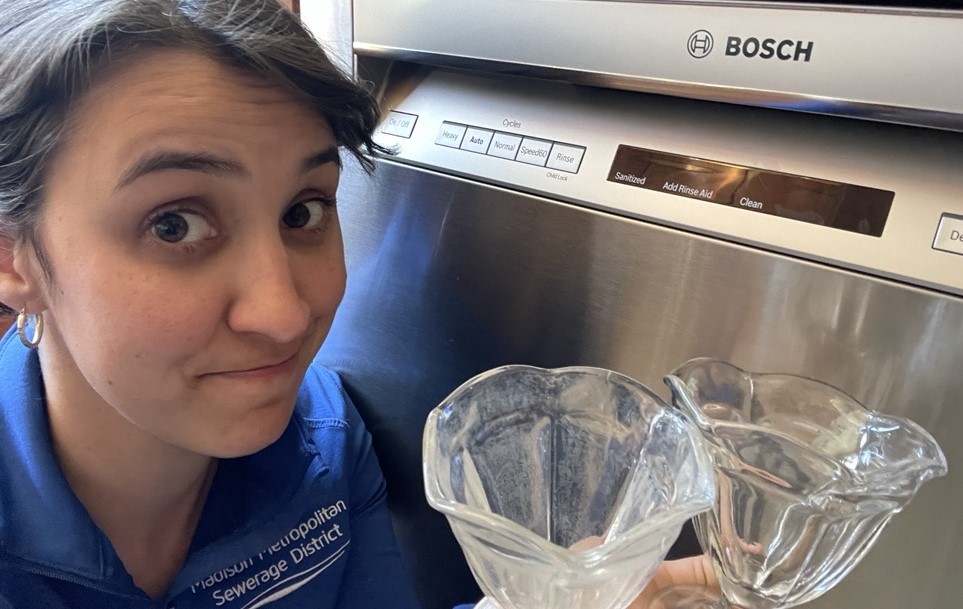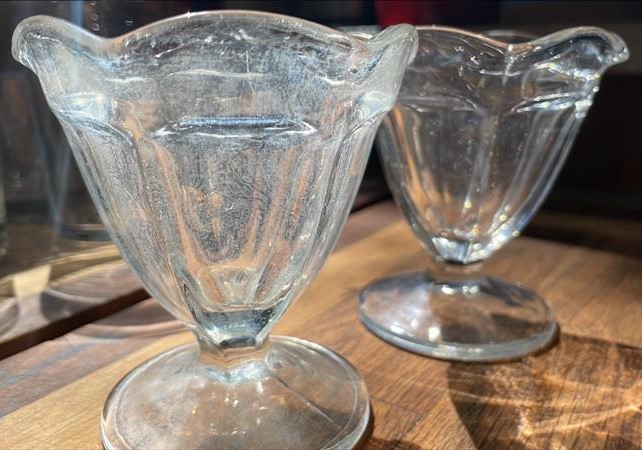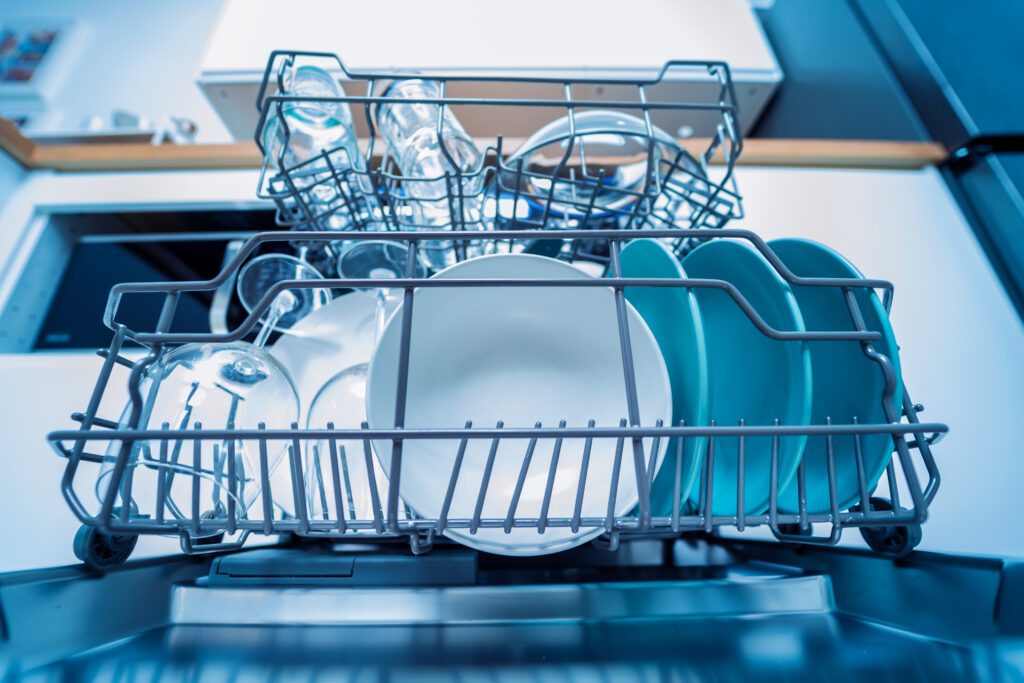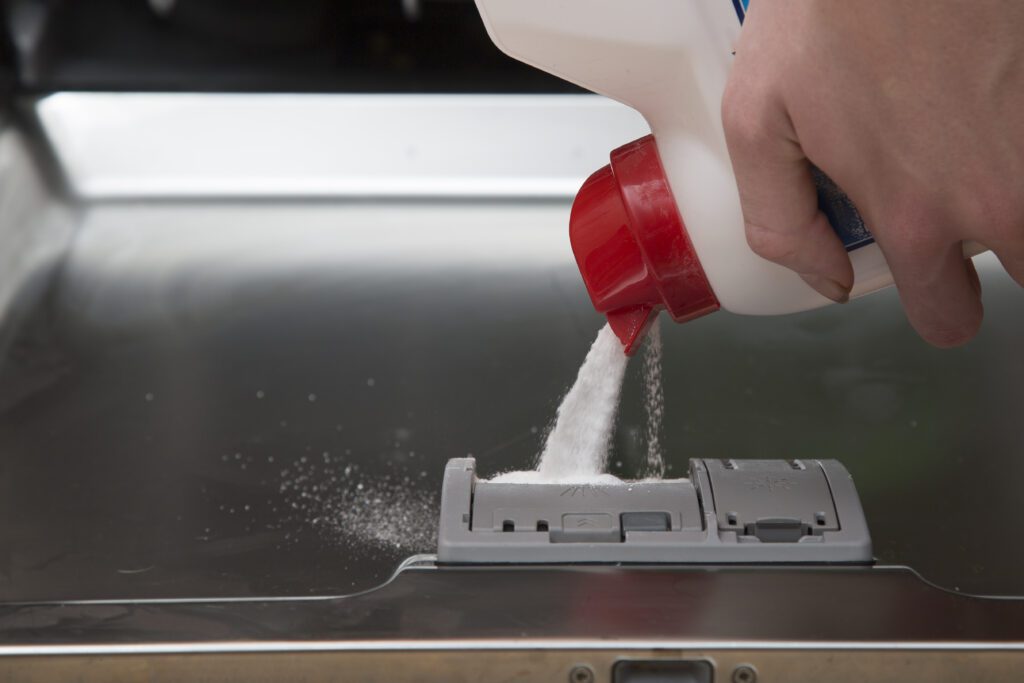#HardWaterHacks is a blog series where we debunk myths and provide practical tips for living with water that’s less softened or using softening alternatives to reduce chloride pollution. Each topic in the series, like this one about spot-free dishes, has been researched through the personal experiences of District pollution prevention specialist Catherine Harris as she embraces our naturally mineral-rich area groundwater, works to change social norms on home salt use and reduces chloride pollution in natural systems.
Written by Catherine Harris

Living in an area with naturally mineral-rich groundwater, you’ve probably noticed the tell-tale signs of hard water on your dishes. White spots? Cloudy glasses? Coffee cups with a little bit of chalky film? And it’s especially frustrating when you’ve just pulled a fresh load out of the dishwasher, only to find that your plates and glasses are not looking clean.
But, spoiler alert: Hardwater might not be to blame at all. Living with hard water and getting clean, shiny dishes IS possible, and with a bit of investigation, you can get to the bottom of your cloudy/spotty dishes – it might not be a result of what you think!
Video HACKS FOR spot-Free dishes
The internet (and social media sites like YouTube or TikTok) is full of hacks to clean spotted dishware – vinegar, Bar Keepers Friend, baking soda with scouring pad, to name a few. More videos than you can imagine with all kinds of hacks are available no more than a search away.
One that was new to me is the professional/restaurant hack to getting sparkling clean stemware is to hold the glasses over steam (could be a steamer or even just a pot of boiling water), and then wipe clean with a microfiber cloth – wow, interesting!
Getting to the root cause

One thing that wasn’t obvious to me with my initial online searches, or until I was about a dozen YouTube videos deep, is that there can be multiple (and different!) causes of cloudy or unclean dishes. Hard water, lack of a softener or a malfunctioning softener are not always to blame. To solve the problem, you really have to get to the root cause. First step: Whether you’re washing dishes by hand or in a dishwasher, you can easily determine that hard water is your problem if the spots come off with a simple wipe-down using a microfiber cloth and some vinegar. If the spots/film comes right off, the answer is it’s probably hard water. All of the hacks related to vinegar, microfiber cloths, Bar Keepers Friend, etc. are probably going to work for you.
A house I lived in previously had this issue – the glasses were cloudy and could never get clean after a vinegar wipe-down, soak or scrubbing. They seemed to be permanently cloudy. If you’re experiencing something similar, with dishes coming out of the dishwasher cloudy, the dilemma gets a little more interesting. Chances are the issue isn’t directly caused by hard water.
If dishes do not wipe clean with vinegar, you may be experiencing a phenomenon called etching. Etching is when glassware gets small scratches on its surface, leaving a permanent cloudy appearance. Etching damage is not repairable in most cases, but it is preventable. According to Maytag, prewashing dishes, soft water use, high water temperature and a lack of soil or grime on glassware before going into the dishwasher are some factors that can cause etching. Yes, you read that correctly – soft water can actually be the culprit of some of this damage. And this makes total sense, given that the place I used to live had a top-notch water softener.
Maytag’s website does a great job of laying out a step-by-step way to triage your problem and some possible solutions.
A dizzying world of detergent options

In the place I currently live, there is no softener, so I could easily rule out soft water as a culprit. The hot water heater only goes up to 120 degrees, so I could also rule out excessive temperature. Prewashing dishes and lack of grime, was also easily ruled out. I checked the manual and did all of the recommended cleaning steps. That only left one thing to explore: the detergent.
Big asterisk here: I’m not endorsing any products in this blog. This is all about my personal journey of navigating hard water, and I’m just sharing my experience in hopes it can help others. Now, back to the experiment.
I took a scientific approach to this – after all, I had nothing to lose except my dirty dishes! I started testing different dishwasher powders in equal conditions to figure out what made the difference. I went through an embarrassing amount of dirty dishes, and after lots of trials and re-washes (sorry, family), I noticed a commonality among all the powders that worked.
The science of dishwasher powders (and what worked for me!)

The list of ingredients in dishwasher powders is wild, if you haven’t ever looked. They are complex chemical mixes, and there is a ton of science that goes into dishwasher powders. To put it as simply as possible, the composition of the water quality coming into a home, how it’s treated in the home and the composition of the cleaning agent should all be a match. If not, some dishwasher detergents can cause glass etching by being too aggressive with the dishes. The ‘chelating agents’ in some detergents are actually designed to work best in hard water. So if you have soft water, these might not be working as intended. If you have soft water coming into your dishwasher, having a detergent that has some kind of glass protectant might work to reduce harm.
Although the ingredient lists for dishwasher detergents are long and complicated, and many of them are words I don’t know and can’t pronounce, there was one commonality among all of the powders that worked. Interestingly, it was a simple substance: citric acid. It’s hard to say if citric acid alone was the ‘golden ticket’ to clean dishes, but given its known ability to break down calcium and magnesium, it’s a likely hunch and what seemed to work for me. I’ve tested several powders with citric acid in the ingredients, and all of them performed significantly better than the powders without it. The dishes came out clean!
Key Takeaways for Spot-Free Dishes
- Don’t assume that hard water is the culprit to hazy dishes. Before jumping to turn up the softener, make sure you’ve explored all options and figured out the actual root cause of the issue.
- Citric acid seems to be an ingredient that, given hard water, helps prevent scale build-up and keeps dishes spot-free.
- Water chemistry is important. Finding the right dishwasher powder and settings can make all the difference. Always test different products to see what works best, especially when you have hard water.
In the end, hard water wasn’t the root cause. It was a mismatch between the water quality and the products used. Don’t throw in the towel, and don’t assume that hard water is to blame until you do a bit of research. Embrace the power of science, and soon enough, you’ll be enjoying sparkling clean dishes, no matter the hardness of your water!
Learn more #HardWaterHacks and ways to reduce salt use at home in the Pollution Prevention section of our website or our blog.






